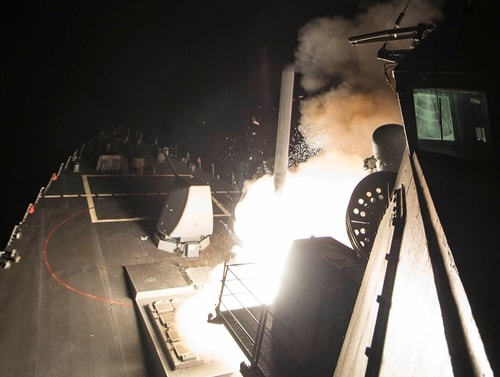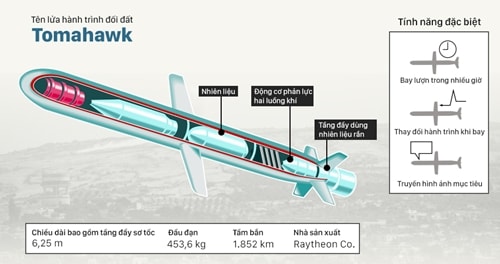Two hypotheses Putin did not intercept US missiles attacking Syrian base
If the decision to intercept US missiles fails, Russia's military capabilities will be put on the line, something President Putin does not want.
 |
A Tomahawk missile launched from the destroyer USS Ross on the morning of April 7. Photo: Reuters |
Observers have long wondered what Russian President Vladimir Putin would do if he were directly challenged in Syria. Unexpectedly, on the morning of April 7, the US launched a series of Tomahawk cruise missiles from the USS Ross and USS Porter in the eastern Mediterranean, targeting targets at the Shayrat base in Homs province, Syria. This was seen as a blow to efforts to break the ice in Russia-US relations.
The US side informed Russia before launching the attack because at that time, there were still Russian officers stationed at the targeted base. With this information, Russia could have found a way to stop the US missiles. However, Moscow did not do so. Why?
US warship launches missiles to attack base in Syria
Popular Mechanics, a science and technology magazine, began looking for answers by assessing Russia's military operations in Syria.
The Syrian government army has deployed Russian air defense systems, but they are old and not capable of handling many cruise missiles at the same time.
Russia has also sent advanced S-300 and S-400 missile defense systems to Syria to protect its Syrian bases. The problem is that all of these advanced systems are deployed only at Russian facilities. According to the Russian Defense Ministry, the S-400 and Pantsir systems are currently located at the Hmeymim base, near al-Assad airport, and the Russian naval base in Tartus.
The Syrian base that was attacked, however, is not far from either of these locations. Moscow upgraded its runway and moved equipment there in late 2015 to allow Russian fighter jets to conduct airstrikes from the base. But Russia has not deployed air defense systems because the Shayrat base is still protected by the S-300 system, which has a range of more than 145 km and a radar coverage of nearly 300 km. In fact, Tomahawk missiles can be programmed to avoid radar networks, but with such tight coverage as Shayrat, this seems an impossible task.
 |
The power of US missiles in airstrikes on Syrian bases. Click on the image to see details. Graphics: Viet Chung |
Russia knew about the US missile launch. US media reported that Washington warned Moscow at least an hour before the action, enough time for Russia to activate its radars, move its mobile launchers and send its best missile operators to the bases.
Therefore, according to experts, President Putin could completely shoot down a series of American Tomahawk missiles and then declare that he wants to protect the lives of his Syrian allies who are fighting against terrorism. Even if the number of American cruise missiles is too large, exceeding the processing capacity of Russian air defense systems, the shooting down of just a few missiles will become evidence for Russia to show the world that American military power is not formidable. In addition, the action to intercept the missiles has less risk of escalating tensions because no American pilots will be killed or injured.
So Putin’s decision not to shoot down the US missiles was likely a tactical choice, analysts say. The Russian president may have wanted to send a message to his Syrian counterpart Bashar al-Assad that his support has limits.
Earlier, the Syrian government army was said to have carried out a chemical attack in the town of Khan Shaikhoun, Idlib province, Syria, killing at least 70 people, including children.
In the defense world, the question of how effective Russian air defense systems are in countering American weapons technology is always a source of curiosity and controversy. Russia earns billions of dollars in profits every year by selling systems that it claims are capable of neutralizing American weapons. If it fails to intercept American missiles, Russia will surely suffer a fatal blow because the whole world will know that Moscow's advertising is not true. This seems to be part of the reason why President Putin decided not to fire.
"Putin could have fired those Tomahawks, but that would have been in no long-term geopolitical interest," commented Popular Mechanics writer Joe Pappalardo.
Image of Syrian airbase after US airstrike
\
According to VNE
| RELATED NEWS |
|---|
